A Century; The first publication of Mujong at the Centennial symposium
In the beginning of 1917, the Maeilshinbo, daily newspaper, started to publish, very first time in Korea, a serial novel entitled Mujŏng. The author was Choonwon Lee Kwang-soo, the giant of Korean literary history. Mujong was published totally unprecedented in literary style, usage of the language, serialization, and more. It was 7 years after the Japan annexed Korea, thus the Korean culture was in a precarious state. Nonetheless, the serial story became an instant success, not only among the learned but also the less educated Koreans. It was written with pure Korean script, Hangul, and was read by well educated, that was unheard of. This phenomenon crashed the boundary between the classes of the society. So, the novel was more than a story telling. It changed Korean society by breaking down the boundary between the classes. This was a significant historical fact of political and social integration of Korean people divided by Hangul. The serialization of story over a year also made the paper sold more.
The novel was written in unity of speech and writing, that was very first in Korean writing. Historically, the available script was only in Chinese characters. Although the King Sejong the Great(1397-1450), of the Chosun Dynasty invented the new Korean alphabet, which was completely a new phonetic script, especially for universal usage for all populace, not like the Chinese script that only learned can use. As the new script was easy to learn as it was close to ordinary spoken Korean, but the aristocrats did not like it and berated. It was used by only small population, mostly by women. The social class of the population was very apparent in early 20th century Korea similar to Indian Caste system. The servant class was banned from learning the letters. King Kojong, in 1985, pronounced the edict that public documents will be written in the new Korean script. But, still the most of written language was mixture of Chinese and new Korean alphabet, similar to the Japanese style. Mujŏng was written all in Hangeul and used the words like they were spoken, such as ‘...handa’ rather than old written expression, like ‘...hanora’. This was epochal as that of Chauser’s Canterbury Tales and Dante’s Divine Comedy.
Professor Hatano Setsuko, professor emeritus of Nigata University, is going to present her paper on Mujong and Hangul in this Symposium.
The first book of Mujŏng was published in 1918 and since then, several dozen versions have been published, and translated in English and Japanese. This novel has been studied by many scholars for a long time in Korea and abroad. Thus, in 2017, there were several commemorative seminars on Mujong in Korea and China, Japan, and even in North Korea and so far 14 papers have been presented in various symposiums this year according to the Choonwon Research Center.
Professor Song Hyun-ho of Ajou University and president of the Choonwon Research Society is going to present his paper on new discovery of Mujong at the centennial year. His overview of the Mujong in the past one hundred years will be valuable to the Choonwon studies. Mujŏng, is akin to Lee Kwang-soo’s autobiography by comparing the situations of those heroes and heroine appeared in the novel. The very protagonist Lee Hyungshik was orphan, not just by loss of parent but also loss of the country to Japan. Of course, a writer’s creative work reflects his or her life. However, Mujong was more than his own life experience and aspiration. Song points out Choonwon’s view of Dosan Ahn Chang-ho’s life reflected deeply and broadly in this novel. Ahn Chang-ho was one of the first Korean immigrants to the United States who tried to educate and enlighten the Korean people for his independence movement against Japanese rule. Song emphasized that study of Mujŏng based on the ideals of American democracy should be a new discovery in his centennial celebration of the first modern novel in Korean history. His point of view is a new shocking information to the Korean people in the United States.
In 2015, in the library of Tokyo University of Foreign Studies, Hatano found Choonwon’s handwritten unpublished poems in a couple of monographs. She and Sogang University faculty members edited a book out of these two monographs this year. Lee Kwang-soo should be rediscovered as a pioneering poet as well in the Korean literary history. He had written more than 200 poems before this discovery, mostly in modern style but some were sijo and some children’s song.
Professor Yang Wang-yong, Poet and the Professor Emeritus of Busan University, divided four periods of Yi’s poetical life. In his paper, he is going to discuss Choonwon’s poems and Choi Nam-sun’s poems as the first ever New Style Poems in the 1910s. Choonwon’s poems were nationalistic and patriotic from the beginning to the end throughout his life. Yang will point out the reflections of times Choonwon encountered with enormous difficulties under Japanese colonial rule. His poems were truly reflections of his painful life in the 1930s and 1940s, some hopes and despairs before and after Liberation of Korea in 1945. There will be readings of Choonwon’s poems at the symposium.
The anticipation of the symposium is kindled with excitement.
*Whenever we call his name Lee Kwang-soo or Yi Kwangsu, always his pen name Choonwon is attached. In fact there are many who only remember his pen name. .
Dr. Kang is an essayist and psychiatrist in Baltimore and Dr. Choi is a poet and writer in Virginia.
<By Dr. Chang Wuk Kang and Dr. Yearn Hong Choi>
스마터리빙
more [ 건강]
[ 건강]이제 혈관 건강도 챙기자!
[현대해운]우리 눈에 보이지 않기 때문에 혈관 건강을 챙기는 것은 결코 쉽지 않은데요. 여러분은 혈관 건강을 유지하기 위해 어떤 노력을 하시나요?
 [ 건강]
[ 건강]내 몸이 건강해지는 과일궁합
 [ 라이프]
[ 라이프]벌레야 물럿거라! 천연 해충제 만들기
 [ 건강]
[ 건강]혈압 낮추는데 좋은 식품
[현대해운]혈관 건강은 주로 노화가 진행되면서 지켜야 할 문제라고 인식되어 왔습니다. 최근 생활 패턴과 식생활의 변화로 혈관의 노화 진행이 빨라지고
사람·사람들
more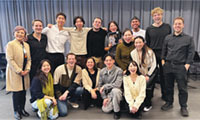
창작 뮤지컬 ‘도산’ 웍샵
창작 뮤지컬 ‘도산’이 뉴욕 맨해튼에서 미국배우조합 리딩 웍샵을 성공적으로 마쳤다. LA 무대예술인그룹 시선(대표 클라라 신)이 제작한 이 작…
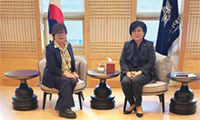
“한국어 교육 확산 협력”
한국어진흥재단(이사장 모니카 류)이 숙명여대(총장 문시연)와 한국어 교육 확산을 위한 협력에 나선다. 한국어진흥재단의 모니카 류 이사장은 지난…
송년행사 시즌 ‘돌입’ 12월 첫 주부터 본격
추수감사절 연휴를 기점으로 남가주 한인사회가 본격적인 송년행사 시즌에 돌입한다. 한 해를 마무리하고 새해를 준비하기 위한 각 단체·동문회의 연…
KYCC·VWKC·주민의회 등 합동 타운 대청소 …
한인타운청소년회관(KYCC)과 헤더 허트 시의원(LA 10지구) 사무실, 그리고 행사에는 윌셔 한인타운 커뮤니티 목소리(VWKC), 내셔널 유…
ROTC 남가주 동지회 골프 모임
ROTC 남가주 동지회(회장 이창훈)는 지난 22일 라미라다 골프코스에서 골프 모임을 열었다. 이날 행사에는 30여 명이 참석해 라운딩을 함께…
많이 본 기사
- 이민 구금자수 역대 최다… 단순 체류위반 20배 폭증
- 추수감사절 ‘포식’, 심장에는 위험 신호 될 수 있다
- 인간의 경쟁자 될까, 든든한 동료 될까… ‘휴머노이드의 진화’
- 유동근♥전인화 CEO 딸, 방송 최초 출연.. “미모? 공들인 얼굴”
- 한인 2세 지나 권씨 주정부 장관에
- 국민연금 증명 편리해진다 온라인 아포스티유 발급
- 트럼프 “백악관 앞 총격은 테러”… 반이민 강화 고삐
- 경찰관이 근무 중 도둑질 차량 수색하며 현금 꿀꺽
- 연말을 향해 달리는 불빛의 궤적
- 집값 상승에 ‘투자 대이동’… 중산층 절반 이상이 ‘주식’
- JP모건, ‘S&P 500 목표가 8,000P’
- 홍콩 77년래 최악 화재… ‘대나무 비계’타고 불길 번졌다
- 이병헌, 레오나르도 디카프리오·티모시 샬라메와 나란히..美시상식 후보
- [마크 A. 시쎈 칼럼] 트럼프 승리를 파괴하는 백인 우월주의자들
- [주말 뭐 볼까 OTT] ‘진정한 사랑은 자본주의가 빼앗을 수 없다’… 사랑의 진짜 가치는?
- 이용대, ♥윤채경 열애설 질문에 당황.. “넘어가 달라”
- 트럼프 행정부, 올해 연방 공무원 32만명 감원
- “에어프레미아, 내년 3월 워싱턴 취항”
- 401K 비차별 테스트 준비
- “반갑다 집값 둔화”… 5개월 연속 90만달러 밑돌아
- 제주에서 수출한 일본판 ‘올레’… 1300년 전 길을 걷다
- [역사 속 하루] 태즈메이니아 섬 발견, 비극의 시작
- ‘이강인 교체 투입’ PSG, 토트넘 5-3 격파
- BTS 정국, 솔로곡 스포티파이 누적 재생수 100억회 달성
- 일주일 강수량이 무려 1.8미터… 동남아 ‘물폭탄 비명’
- ‘도우인 메이크업(중국식 메이크업)’ 붐 타고… 동남아·일본 등 폭풍성장
- 극단적 선택 시도 고백 후..MC몽, 이번엔 사기 피해 당부
- 트럼프 관세발 물가… ‘정책 유턴’ 신호탄?
- 아마존, 사기 급증 경고 연말맞아 회사 사칭 극성
- LA 주차위반 단속 강화… 티켓 발부… 1
- [한국춘추] 감사의 힘
- 국방부, 알리바바 제재 중국군 지원 명단 포함
- 개인적 상처를 판타지로 승화시킨 감독의 용기
- LA 주민 3분의 2 “카운티 잘못된 방향 간다”
- [금요단상] 장미의 이름, 진리의 이름
- ‘5년내 유료구독자 2억2,000만명’
- 증시, 연휴 휴장·반장 오늘 오후 1시까지만
- 겨울철 심장 관리… 오메가3·크릴오일 질환 예방 효과 ‘글쎄’
- 추수감사절 연휴 맞아 LA 오토쇼 관람 인기
- [만화경] AI 거품론과 ‘그린스펀 오판’
- 2026년 은퇴플랜 불입금 상한선 변화
- 오늘 블랙 프라이데이, 샤핑시즌 개막
- “캠벨수프 소비자는 빈곤층” 발언 논란
- 송성문 행선지로 다저스·샌디에고 예상
- [이런 일도] ‘인간 세탁기’ 나온다
- 오바마케어 보조금 연장 이뤄져야
- 리듬과 시조, 미래의 언어
- 우파활동가 암살에 주방위군 피격…긴장… 1
- “고용 소폭 감소… 노동수요 약화”
- ‘오픈AI’ 분석 파트너사 해킹 당해
1/5지식톡

-
 테슬라 자동차 시트커버 장착
0
테슬라 자동차 시트커버 장착
0테슬라 시트커버, 사놓고 아직 못 씌우셨죠?장착이 생각보다 쉽지 않습니다.20년 경력 전문가에게 맡기세요 — 깔끔하고 딱 맞게 장착해드립니다!장착비용:앞좌석: $40뒷좌석: $60앞·뒷좌석 …
-
 식당용 부탄가스
0
식당용 부탄가스
0식당용 부탄가스 홀세일 합니다 로스앤젤레스 다운타운 픽업 가능 안녕 하세요?강아지 & 고양이 모든 애완동물 / 반려동물 식품 & 모든 애완동물/반려동물 관련 제품들 전문적으로 홀세일/취급하는 회사 입니다 100% …
-
 ACSL 국제 컴퓨터 과학 대회, …
0
ACSL 국제 컴퓨터 과학 대회, …
0웹사이트 : www.eduspot.co.kr 카카오톡 상담하기 : https://pf.kakao.com/_BEQWxb블로그 : https://blog.naver.com/eduspotmain안녕하세요, 에듀스팟입니다…
-
 바디프렌드 안마의자 창고 리퍼브 세…
0
바디프렌드 안마의자 창고 리퍼브 세…
0거의 새제품급 리퍼브 안마의자 대방출 한다고 합니다!8월 23일(토)…24일(일) 단 이틀!특가 판매가Famille: $500 ~ $1,000Falcon: $1,500 ~ $2,500픽업 & 배송직접 픽업 가능LA…
-
 바디프렌드 안마의자 창고 리퍼브 세…
0
바디프렌드 안마의자 창고 리퍼브 세…
0거의 새제품급 리퍼브 안마의자 대방출 한다고 합니다!8월 23일(토)…24일(일) 단 이틀!특가 판매가Famille: $500 ~ $1,000Falcon: $1,500 ~ $2,500픽업 & 배송직접 픽업 가능LA…
케이타운 1번가
오피니언

오바마케어 보조금 연장 이뤄져야

UC, 등록금 인상 자제 노력 더 해야한다
 마크 A. 시쎈 / 워싱턴포스트 칼럼니스트
마크 A. 시쎈 / 워싱턴포스트 칼럼니스트 [마크 A. 시쎈 칼럼] 트럼프 승리를 파괴하는 백인 우월주의자들
 유경재 나성북부교회 담임목사
유경재 나성북부교회 담임목사 [한국춘추] 감사의 힘
 김인자 시인·수필가
김인자 시인·수필가 [금요단상] 장미의 이름, 진리의 이름
 최호근 / 고려대 사학과 교수
최호근 / 고려대 사학과 교수 [역사 속 하루] 태즈메이니아 섬 발견, 비극의 시작
 최형욱 / 서울경제 기자
최형욱 / 서울경제 기자 [만화경] AI 거품론과 ‘그린스펀 오판’
 조재성 LA 포럼 회장·도시비평가
조재성 LA 포럼 회장·도시비평가 [조재성 박사의 두 도시 이야기] 코리아타운, 불완전함의 아름다움
 김재천 서강대 국제대학원 교수
김재천 서강대 국제대학원 교수 [김재천 칼럼] 경제로 안보를 사는 시대
1/3지사별 뉴스

정혜선한국전통예술원 ‘아리랑-동방의 울림’공연 성황
정혜선한국전통예술원의 특별공연 ‘아리랑-동방의 울림’(Arirang-Echoes of the East)이 지난 23일 전석 매진속에 뉴저지 포…
오바마케어 보조금 2년 더 연장되나

“에어프레미아, 내년 3월 워싱턴 취항”
신생 항공사인 에어프레미아(Air Premia, 사진)가 내년 3월부터 인천과 워싱턴 덜레스 공항을 정기운항할 것으로 알려져 관심이 쏠린다.한…
마이클 박 연방 판사 ‘유력한 대법관 후보자로 급부상’

트럼프 “총격당한 주방위군 병사 2명 중 1명 사망”
도널드 트럼프 대통령은 27일 아프가니스탄 출신 이민자로부터 전날 워싱턴DC의 백악관 인근에서 총격을 당한 주방위군 병사 2명 중 1명이 사망…
피아니스트 조성진, 내년 1월 SF에 온다

오늘 하루 이 창 열지 않음 닫기 




























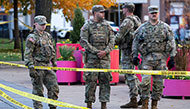



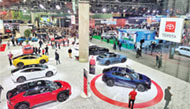



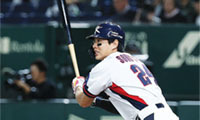













.png)


댓글 안에 당신의 성숙함도 담아 주세요.
'오늘의 한마디'는 기사에 대하여 자신의 생각을 말하고 남의 생각을 들으며 서로 다양한 의견을 나누는 공간입니다. 그러나 간혹 불건전한 내용을 올리시는 분들이 계셔서 건전한 인터넷문화 정착을 위해 아래와 같은 운영원칙을 적용합니다.
자체 모니터링을 통해 아래에 해당하는 내용이 포함된 댓글이 발견되면 예고없이 삭제 조치를 하겠습니다.
불건전한 댓글을 올리거나, 이름에 비속어 및 상대방의 불쾌감을 주는 단어를 사용, 유명인 또는 특정 일반인을 사칭하는 경우 이용에 대한 차단 제재를 받을 수 있습니다. 차단될 경우, 일주일간 댓글을 달수 없게 됩니다.
명예훼손, 개인정보 유출, 욕설 등 법률에 위반되는 댓글은 관계 법령에 의거 민형사상 처벌을 받을 수 있으니 이용에 주의를 부탁드립니다.
Close
x